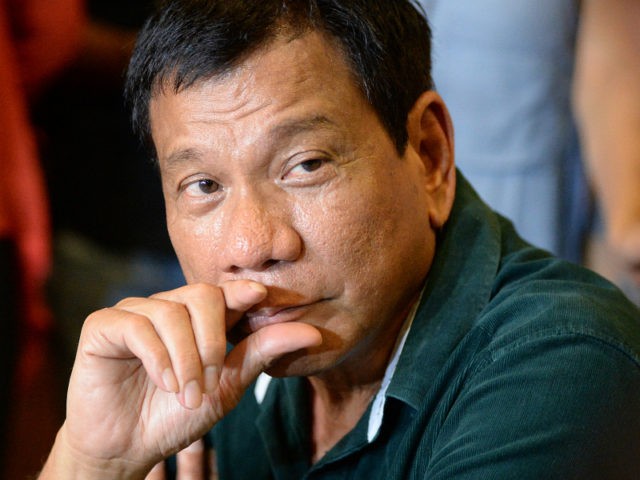American troops are providing aid to their Philippine counterparts against an attempt to establish an Islamic State caliphate in the nation’s south. U.S. officials say the aid comes “at the request” of the Philippines, while President Rodrigo Duterte denies ever having asked for help.
“At the request of the government of the Philippines, US special operation forces are assisting the AFP with ongoing operations in Marawi. The US non-combat support helps AFP commanders on the ground in their fight against Maute and ASG (Abu Sayyaf Group) militants,” Molly Koscina, a spokeswoman for the American Embassy in Manila, told the Philippine Star in a statement.
The statement clarified that no American troops are in the line of fire in Marawi, the country’s only official “Islamic city,” but instead are providing what the Star refers to as “technical assistance.”
U.S. Ambassador to the Philippines Sung Kim, confronted by reporters Monday, said the U.S. would continue “to provide counter-terrorism support for the Armed Forces of the Philippines” when necessary. “This is a cooperation that has continued for some time now, it’s a cooperation that’s appreciated by the Philippines military and it’s a co-operation that’s continued with the knowledge of the Philippines government and the AFP.”
Officials of the Armed Forces of the Philippines (AFP) also confirmed the cooperation, emphasizing that U.S. troops have no combat role in Marawi. “They are not fighting. They are just providing technical support,” AFP spokesman Lt. Col. Jo-Ar Herrera told reporters.
Presidential spokesman Ernest Abella also reiterated that American functions in the region are “limited to technical assistance” while speaking to reporters on Sunday. “We have standing protocols which are already in place under the Mutual Defense Board-Security Engagement Board with the US under the purview of the PH-US Mutual Defense Treaty of 1951. It does not involve any boots on the ground nor is there any direct participation in combat operations, a matter prohibited by law.”
“The Philippines is open to assistance from other countries if they offer it,” he added, without specifying whether any particular countries had offered such assistance.
Local reports of American surveillance operations on Mindanao, where the Islamic insurgency sprouted, suggested that troops were flying drones to gather intelligence in the area.
President Duterte appeared hesitant to accept that U.S. troops were helping his soldiers fight the Islamic State, sighing to reporters on Sunday, “I have to be thankful. [The help is] already there.”
“I never approached any American to say, ‘Tumulong kayo (Help us),'” Duterte added. “We don’t really need their help. Maybe a little).”
During the Obama administration, Duterte often used harsh rhetoric against the United States, declaring that he would sever diplomatic ties with American to join a “new world order” with China and Russia.
In September 2016, he had specifically demanded that U.S. troops leave the southern Philippines, home to a number of jihadist groups. “The special forces, they have to go. They have to go in Mindanao. There are many whites there,” he said, using “white” to refer to Middle Eastern Muslims. “If they see an American, they would kill him. They would demand ransom then kill him… I do not want a rift with America. But they have to go,” he insisted.
Duterte’s disposition towards the United States softened following the election of President Donald Trump. “President Trump and I are okay. I am okay with President Trump and I can assure him also of our friendship and cooperation,” Duterte said in March. “We have no problem there.”
A month later, Duterte walked back his hesitation in having U.S. troops participate in the war on terrorism in the Philippines. “As we fought together to stay above the enemy then, so we should help each other to address the threats that confront our societies, our region, and our world,” Duterte said.
Since then, two jihadist groups in Mindanao – the island where Duterte lives, having rejected living in Manila’s presidential palace, Malacanang – have overrun the city of Marawi and attempted to establish a caliphate there.
The Maute group and Abu Sayyaf have both pledged allegiance to the Islamic State, and Duterte claimed that ISIS “caliph” Abu Bakr al-Baghdadi personally ordered the Marawi raid this weekend. “Now it appears al-Baghdadi himself, the leader of the ISIS, has specifically ordered terroristic activities here in the Philippines,” he said, citing security officials.

COMMENTS
Please let us know if you're having issues with commenting.